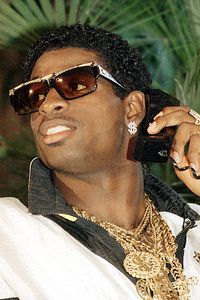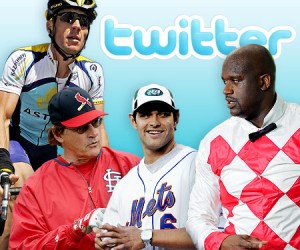
What's up everyone, it's Zach Randolph, Power Forward in the NBA. I was drafted nineteenth overall by the Portland Trail Blazers in the 2001 draft and have since adorned jerseys for three other franchises (New York Knickerbockers, Los Angeles Clippers, and currently the Memphis Grizzlies). I stand six feet, nine inches tall, and was the 2003-2004 NBA season’s Most Improved Player of the year.
--You don't believe me? How are you even suspicious? What if i stuck my photo in here..hold on...
...there. How about now?
Your doubts can be summed up best by the old adage to not believe everything you read. If you pass this site on, the next reader would be equally as cynical through the first paragraph as you probably were. Then why is it that so many internet-friendly sports fans believe any transcribed thought attributed to their favorite players’ online?
At its inception, the World Wide Web’s role with sports fans was to provide easily available and more immediate statistics as well as quicker news relay then the traditional print medium could provide.
The notion of waiting a full day for box scores and batting averages is completely foreign to any fan born during, or after the first Bush presidency.
Over time, the Internet become the primary source for sport information as the days of newspapers have become as symbolically aged and brittle [in their archaic style and understanding of today’s media], and black and white [in their dire fate] as their printed appearance. The Internet has slowly grown out of its humble beginnings and has become a tool for all fans to live vicariously through their sports idols and teams in ways never imagined.
It began innocently enough with “Fantasy Sports”. Fantasy Sports are, in a sense, a vehicle for

fans to carry out their deepest athletic fantasies absent of their actual play. Its a field (and product) that has consistently increased in popularity since its meager beginnings 19-plus years ago.
In 1991, it was reported that one million people were participating in fantasy sports in America. Only sixteen years later, the Fantasy Sports Trade Association reported that in 2007, roughly thirty-million people, ages twelve and up, were now playing fantasy sports in North America. That is an average increase of 1,812,500 people per year. Soon pretending to be them “on-the-field” wasn’t satisfying enough; off-the-field was the next frontier and with the invention of peer-to-peer networking, social-media sites has dramatically expanded the scope of the Internet as a sports fan's tool.
The player-fan dynamic is crucial to the livelihood of sports business. This relationship is the“heart beat” of all professional sport entities’ “bottom line”. Consider that if fans had slim interest in the players themselves that play these games, the revenue generated by these behemoths of corporations would be substantially less than what they make, even in these hard economic times. Their profit generating platforms are the result of fan admiration, not the product on-the-field.

A game void of such fan interest would have mean no "Neon Deion", no "Jump Man Twenty-Three", and nobody would know, much less care, about BO. So when the proverbial distance and boundary lessens between the fan and the athlete with the influx of online usage, its effects will reverberate throughout the entire business.
The infusion of sites like Myspace, Facebook, and Twitter, into our daily lives has irreparably
changed the way we converse and connect with one another. One major shift is how much more of a sensationalist society we have become. Much of our communication used to come through inference and actual verbal communication. Now every is documented. Pictures from last night’s party are a “must”, conversations that used to take mere minutes can take hours through text messaging. The boldest aspect of this change is the ability to mold yourself to be seen however you wish. that long text message conversation can take as long as it is because both parties have the ability to think about their response as long as they wish. There is a growing "need" to represent yourself exactly how you wish to be perceived. The public image maintenance can now be done in a tangible manner, i.e. pictures, or personal profile descriptions networking sites.
communication and the way we communicate through human existence has always been a great barometer in telling us about ourselves as people. Television is a prime example today, you know exactly who the main audience is for that respective channel and time slot depending upon the types of products being shown during commercial breaks. I think when our civilization looks back on what the Internet has taught us about ourselves as a collective people, it would be that we love pornography, free things, and other people’s lives (and if all three of those qualities can be combined into one: Jackpot. and if you don't believe me, tell me why Pamela Anderson, Paris Hilton, Kim Kardashian, and Monica's little brother as so famous).
The advantages of using these sites are undeniable in terms of communication, but with these
benefits, comes unprecedented circumstances. With these issues in mind, it appears more and more fans have begun to engage in quasi-identity theft by creating fake player communications sites, and posing as those respective players with them. One has to wonder if these falsified high profile identities strain the relationship in question, or crossed the aforementioned athlete-fan relationship boundaries line. These questions became the basis of my contemplation, but before they can be addressed, some further background info will be needed.
The story behind what spurred on this investigation is completely and utterly a “had to be there” moment and nobody likes hearing those after the fact so I won’t bore you with this one (but if you're really intrigued, we strongly suggest "
Zach Randolph visits Zack's Room" on Youtube. It was a primary provocateur.)
After reading several humorous fake twitter accounts that had cropped up during the rise of initial twitter-athlete use, it was brought up by a member of "the crew" how funny a Zach Randolph twitter would be, thus the idea was conceived. I was a bit hesitant at first, I think twitter is excessive and if i'm not willing to post my own random musings (not that they aren't great, they're just too good for you), I'm not going to produce fake ones attributed to someone else..but obviously I relented or you wouldn't be reading this, and “ZBO50” was born.
First it was benign comments about sushi and missing shots in games, but people somehow still found interest in them, and began “following” us. Randolph fans would reply to the twitter with fan mail for the hoopster. I quickly realized the unbelievable control I had over Zach’s reputation and image. I decided to make “Z-Bo’s” twitter a social experiment.
Before delving any further into the topic, I must express that although my actions may lead you to believe otherwise, I do not condone identity theft of any kind, to any degree. My decision to make a fake twitter, regardless of its academic groundings, is not exempt from this line of thinking so if this reaches the hands of Mr. Randolph, I’d like to formally apologize in advance for any inconvenience my weeklong experience caused.
With that said, I set forth the week of March 20th, 2009 with two goals in mind. One, I wanted to reach a deeper understanding of fan infatuation. And secondly, I wanted to make Zach Randolph have to respond to my twitter use under the guise of his image. The insane possibility a college student in Woodenhuelike, Tanoe, USA, had the ability to control a professional athlete's public image to a certain degree, or even more simply, have any effect on his life at all, is what it boils down to. This is a prospect that would have been incomprehensible, if proposed five years ago.
Throughout the week we'll be posting our five-piece exposé (Monday, the "Groupie Love" Section will be up) on the week I was "Zachary (Mckinlee) Randolph" and lived a virtual microcosm of an NBA players life.
comments, suggestions, inquiries, and hate mail can be made out to 35isntenough@gmail.com
 What's up everyone, it's Zach Randolph, Power Forward in the NBA. I was drafted nineteenth overall by the Portland Trail Blazers in the 2001 draft and have since adorned jerseys for three other franchises (New York Knickerbockers, Los Angeles Clippers, and currently the Memphis Grizzlies). I stand six feet, nine inches tall, and was the 2003-2004 NBA season’s Most Improved Player of the year.
What's up everyone, it's Zach Randolph, Power Forward in the NBA. I was drafted nineteenth overall by the Portland Trail Blazers in the 2001 draft and have since adorned jerseys for three other franchises (New York Knickerbockers, Los Angeles Clippers, and currently the Memphis Grizzlies). I stand six feet, nine inches tall, and was the 2003-2004 NBA season’s Most Improved Player of the year.









0 Response to "Mini Series: Addicts? A look at the Player-Fan Relationship"
Post a Comment